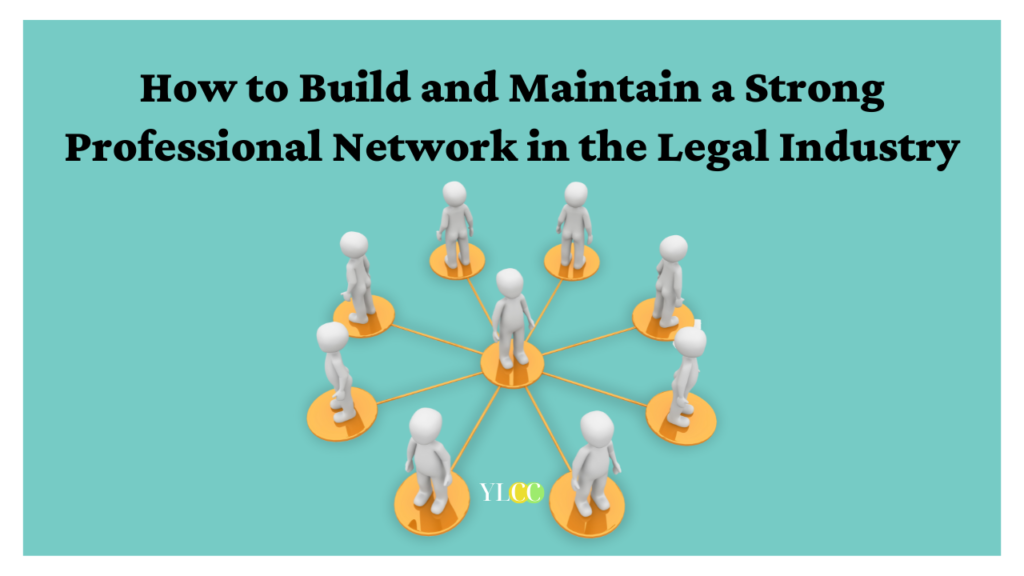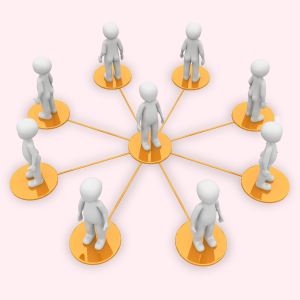
Ahem, ahem. Gather around, folks, and let me tell you the tale of how to build and maintain a strong professional network in the legal industry. Because, let’s be honest, it’s not about what you know, it’s about who you know. And if you don’t know anyone, well, good luck out there in the wild west of legal job searching. So, let’s get to it and learn how to schmooze your way to the top.
Building Your Professional Network
Hunting Down Your Prey
Networking events can be a great way to meet new people in the legal industry, but let’s be real, some of them can be a total snooze fest. In this section, we’ll cover some tips for identifying potential networking opportunities that won’t put you to sleep.
- Check out industry events and conferences: Look for events and conferences that are specific to the legal industry. These can be a great opportunity to meet professionals in your field and learn about the latest industry trends.
- Attend alumni events: If you went to law school, check out alumni events in your area. This can be a great way to reconnect with former classmates and meet other professionals in the legal field.
- Join professional organizations: There are many professional organizations that are specific to the legal industry. Joining one of these groups can provide opportunities for networking, professional development, and staying up-to-date on industry news.
Once you’ve found some possible networking events to go to, the next step is to find other job seekers without seeming like a total weirdo. Here are some tricks to help you out:
- Dress the part: Dressing professionally can help you stand out as someone who takes their career seriously. Wear business attire that is appropriate for the event or conference you’re attending.
- Take The Initiative: Don’t wait for people to approach you. Take the initiative and introduce yourself to others. Start with a simple introduction and ask questions about their career and interests.
- Listen More Than You Talk: When you’re networking, it’s important to listen more than you talk. Ask questions and show a genuine interest in what others have to say.
- Exchange Contact Information: When you meet someone who you’d like to stay in touch with, exchange contact information. This can be a business card or a simple exchange of email addresses. Don’t forget to follow up with them after the event or conference.
Nurturing and Maintaining Your Network
Following Up Like a Pro
Networking events can be great for meeting new people, but it’s what you do after the event that really counts. Here are some tips for following up effectively:
- How To Follow Up After Networking Events Without Coming Across As Desperate Or Annoying: It’s important to strike a balance between being persistent and being a pest. You want to show your interest, but you don’t want to be too aggressive. A good rule of thumb is to send a follow-up email within 24-48 hours of the event, thanking the person for their time and expressing your interest in staying in touch. Keep your email short and sweet, and don’t forget to personalize it!
- Crafting The Perfect Follow-up Email That Will Get You Noticed: Your follow-up email should be concise and to the point. Start by thanking the person for their time and mentioning something specific you talked about during the event to remind them of who you are. Then, express your interest in staying in touch and suggest a specific way to do so, such as meeting for coffee or setting up a phone call. Be sure to include your contact information and a call-to-action to encourage the person to respond.
- Strategies For Staying In Touch Without Being A Pest: Once you’ve made contact with someone, it’s important to stay in touch without overdoing it. One way to do this is to set up a schedule for reaching out, such as checking in once a month or every few months. You can also look for opportunities to add value, such as sharing an interesting article or introducing them to someone in your network who might be able to help them. Remember, networking is about building relationships, so focus on how you can help others as well as how they can help you.
The Art of Relationship Building
Finding Your Work BFF: The Importance of Mentors and Sponsors in the Legal Industry
Having a mentor or sponsor can be incredibly beneficial to your professional growth, but it’s important to know how to build and maintain these relationships effectively. This section will cover the importance of having a mentor or sponsor, how to find one that’s a good fit for you, and ways to add value to their lives.
Finding A Mentor Or Sponsor That’s A Good Fit For You
When it comes to finding a mentor or sponsor, it’s important to look for someone who has experience and expertise in your field and who shares your values and goals. They should also be someone who is willing to invest time and energy into helping you grow and develop professionally.
One way to find a mentor or sponsor is to look within your professional network. You can also reach out to people in your industry or attend events and conferences to meet new people and make connections.
Ways To Add Value To Your Mentors And Sponsors’ Lives
Building a relationship with a mentor or sponsor is a two-way street. While they can offer guidance and support to help you achieve your goals, it’s important to find ways to add value to their lives as well. Some ways to do this include sharing your own knowledge and expertise, offering to assist them with their work or projects, or simply staying in touch and keeping them updated on your progress.
By building and maintaining strong relationships with mentors and sponsors, you can gain valuable insights and support that can help you advance your career and achieve your goals.
Keeping in Touch with the Old Gang
Let’s face it – your old colleagues and classmates can be valuable connections in your professional network. But how do you stay in touch without being that creepy ex that won’t stop calling?
- Make It A Priority: When it comes to staying in touch, out of sight often means out of mind. So, make it a priority to keep in touch with your old colleagues and classmates.
- Use Social Media: LinkedIn, Facebook, Twitter, Instagram – there are plenty of social media platforms that can help you stay connected with your old gang. Share updates on your professional life, comment on their posts, and engage in conversations.
- Schedule Catch-Ups: Whether it’s a coffee catch-up, a virtual happy hour, or a dinner party, scheduling regular catch-ups is a great way to maintain relationships with your old colleagues and classmates.
- Find Common Ground: Yes, you may have gone your separate ways, but that doesn’t mean you can’t find common ground beyond work or school. Maybe you share a passion for cooking, hiking, or volunteering. Use that to your advantage.
- Be Genuine: Don’t just reach out to your old colleagues and classmates when you need something. Be genuine in your interactions and show a real interest in their lives and careers. Remember, networking is a two-way street.
Collaborating for Success: The Art of Creating Mutually Beneficial Relationships in Networking
Creating opportunities for collaboration and mutually beneficial relationships is a crucial aspect of networking. When you connect with someone in your professional network, it’s important to look for ways that you can both benefit from the relationship. One way to create opportunities for collaboration is to identify common goals or interests.
Perhaps you and a colleague both have a passion for environmental issues or are interested in working with a specific client or industry. By identifying these shared interests, you can explore opportunities to collaborate on projects or pursue similar professional goals together.
Another way to create mutually beneficial relationships is to offer to help others in your network. Whether it’s by sharing resources, making introductions, or providing advice, offering your assistance can help to establish yourself as a valuable connection and build trust with others in your network.
It’s also important to be open to receiving help from others in your network. Don’t be afraid to ask for assistance or advice when you need it, as this can also help to strengthen your relationships with others.
The Dangers of Only Networking When You Need Something
One of the biggest mistakes people make when it comes to networking is only reaching out when they need something, such as a job or a referral. This is a huge turnoff for potential connections, and can quickly damage any relationships you’ve built. Instead, it’s important to focus on building genuine relationships with people, without the expectation of anything in return. This means taking the time to get to know people, being interested in their lives and careers, and finding ways to add value to their lives.
How to Avoid Being Overly Transactional in Your Networking Approach
Another common networking mistake is being overly transactional in your approach. This means only talking to people because you think they can help you get ahead, without any real interest in them as people. This approach can be off-putting, and can quickly turn potential connections off. Instead, try to focus on building real relationships with people, based on mutual respect and shared interests. This means taking the time to get to know people, finding common ground, and finding ways to help each other out.
Common Networking Pitfalls to Avoid
There are many common networking pitfalls that people fall into, such as being too pushy or aggressive, failing to follow up after a networking event, or failing to build a genuine connection with people. To avoid these pitfalls, it’s important to approach networking with a positive, open-minded attitude, and to take the time to build genuine connections with people. This means being patient, taking the time to get to know people, and finding ways to add value to their lives. Additionally, it’s important to be professional, polite, and respectful in all of your interactions, both online and offline. By avoiding these common pitfalls, you can build a strong and effective professional network that will serve you well throughout your career.
Conclusion: Build Your Network Like a Boss!
So there you have it, folks! You now have all the tips and tricks you need to build and maintain a professional network that will make you the envy of all your colleagues.
Remember, networking isn’t just about getting a job or a promotion, it’s about building genuine relationships that can help you throughout your career. So don’t just connect with someone because you think they can give you something, approach it with a mindset of adding value to their lives too!
In summary, keep these key strategies in mind:
- Identify potential networking opportunities that align with your interests and goals
- Be effective and natural when networking at events and conferences
- Build a strong online presence that showcases your skills and interests
- Leverage social media to connect with professionals in your field
And once you’ve made those connections, remember to:
- Follow up like a pro
- Build and maintain relationships with mentors and sponsors
- Stay connected with former colleagues and classmates
- Look for opportunities for collaboration and mutually beneficial relationships
And last but not least, always remember to be authentic and genuine in your networking efforts. It’s not just about what you can get, it’s about what you can give. Happy networking, boss!
YLCC would like to thank Pearl Narang for her contribution in this article.






